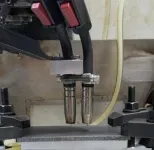(Press-News.org) PULLMAN, Wash. – Taking a cue from the structural complexity of trees and bones, Washington State University engineers have created a way to 3D-print two types of steel in the same circular layer using two welding machines. The resulting bimetallic material proved 33% to 42% stronger than either metal alone, thanks in part to pressure caused between the metals as they cool together.
The new method uses commonplace, relatively inexpensive tools, so manufacturers and repair shops could use it in the near term. With further development, it could potentially be used to make high-performance medical implants or even parts for space travel, said Amit Bandyopadhyay, senior author of the study published in the journal Nature Communications.
“It has very broad applications because any place that is doing any kind of welding can now expand their design concepts or find applications where they can combine a very hard material and a soft material almost simultaneously,” said Bandyopadhyay, a professor in WSU’s School of Mechanical and Materials Engineering.
The research team borrowed the idea from nature, noting that trees and bones get their strength from the way layered rings of different materials interact with each other. To mimic this with metals, the WSU researchers used welding equipment commonly found in automotive and machine shops, integrated inside a computer numerical control or CNC machine. The new hybrid setup creates parts using precise computer programming and two welding heads.
In a demonstration, the two welding heads worked one right after the other on a circular layer to print two metals, each with specific advantages. A corrosion-resistant, stainless-steel core was created inside an outer casing of cheaper “mild” steel like that used in bridges or railroads. Since the metals shrink at different rates as they cool, internal pressure was created – essentially clamping the metals together. Tests on the result showed greater strength than either stainless steel or mild steel has on their own.
Currently, 3D printing with multiple metals in a welding setup requires stopping and changing metal wires. The new method eliminates that pause and puts two or more metals in the same layer while the metals are still hot.
“This method deposits the metals in a circle instead of just in a line. By doing that, it fundamentally departs from what’s been possible,” said Lile Squires, a WSU mechanical engineering doctoral student and the study’s first author. “Going in a circle essentially allows one material to bear hug the other material, which can’t happen when printing in a straight line or in sandwiched layers.”
The capability to strengthen 3D-printed metal parts layer-by-layer could give automotive shops new options soon with the ability to quickly create strong, customized steel parts. Bimetallic, torque-resistant axle shafts, for instance, or cost-effective, high-performance brake rotors could be developed.
In the future, the researchers see the potential for medical manufacturing processes that print joint replacements with durable titanium on the outside and an inner material such as magnetic steel with healing properties. Likewise, structures in space could have a high-temperature resistant material surrounding inner material with cooling properties to help the structure maintain a consistent temperature.
“This concept has both welders printing, so we can use multiple materials in the same layer itself, creating advantages as they combine,” said Bandyopadhyay. “And it doesn't have to stop at just two materials. It can be expanded.”
The researchers and WSU have submitted a provisional patent application for this development. In addition to Bandyopadhyay and Squires, the research team includes second author Ethan Roberts, a WSU undergraduate mechanical engineering student. This research received support from the National Science Foundation.
END
New 3D-printing method builds structures with two metals
2023-06-22
ELSE PRESS RELEASES FROM THIS DATE:
Global analysis on pollinators in cities: Wild bees and butterflies are at particular risk
2023-06-22
Butterflies are being hit hardest by urban growth. Shrinking habitats and food availability are causing their populations to decline. The same applies to many wild bees that fly early in spring. According to a new study by the Martin Luther University Halle-Wittenberg (MLU) and the Chinese Academy of Sciences in "Ecology Letters", pollination has not yet been impacted by this because honeybees, for example, can compensate for the reduction of urban pollinators. The study is the first comprehensive analysis of the subject and includes data from 133 studies. The results underline the importance ...
Lifetime burden of psychological symptoms, disorders, suicide due to cancer in children, adolescents, young adults
2023-06-22
About The Study: This systematic review and meta-analysis including 52 studies found children, adolescent, and young adult patients with cancer experience an increased risk of depression, anxiety, and psychotic disorders after cancer remission compared with siblings and noncancer-matched controls. Timely identification, preventive efforts, and psycho-oncological intervention for psychological comorbidity are recommended.
Authors: Ainsley Ryan Yan Bin Lee, M.B.B.S. (Hons.), and Cyrus Su Hui Ho, Ph.D., of the National University of Singapore, are the corresponding authors.
To access the embargoed study: Visit our For The Media ...
Space travel alters gene expression in white blood cells, weakening our immune system
2023-06-22
Evidence is mounting that astronauts are more susceptible to infections while in space. For example, astronauts on board the International Space Station (ISS) commonly suffer from skin rashes, as well as respiratory and non-respiratory diseases. Astronauts are also known to shed more live virus particles, for example Epstein-Barr virus, varicella-zoster responsible for shingles, herpes-simplex-1 responsible for sores, and cytomegalovirus. These observations suggest that our immune system might be weakened by space travel. But what could cause such an immune deficit?
“Here we show that the expression of many ...
World's biggest study of wildfire smoke impact reveals alarming long-term health impacts
2023-06-22
As North America recovers from some of the worst air quality in decades due to wildfires, one of the largest and most comprehensive studies into the long-term health impact of smoke exposure raises significant concerns about the long-term health impact of the Canadian wildfires.
The study found that a 10 μg/m3 increase of wildfire-related PM2.5 exposure was associated with a 0.4% higher risk of all-cause and nonaccidental mortality, and a 0.5% increase in risk of dying from neoplasms. On June 8, at the peak of the wildfire pollution, ...
Lack of registration is limiting access to essential medicines in Kenya, Tanzania and Uganda
2023-06-22
The lack of registration of medicines in Kenya, Tanzania and Uganda is limiting access to safe, effective, and affordable essential medicines, according to a new analysis from Newcastle University in the UK and Makerere University in Uganda, published by the Journal of the Royal Society of Medicine.
Before a medicine can be made available in a country, manufacturers must apply to the medicine regulatory agency of the country for a licence to sell it and demonstrate the medicine is safe and effective. This is known as market registration.
The researchers compared the ...
UQ researchers tackle viruses with pandemic potential
2023-06-22
Researchers have shed light on how a highly infectious virus, that has recently transferred from animals to people, is able to enter human cells.
The University of Queensland’s Dr Ariel Isaacs and Dr Yu Shang Low have uncovered the structure of the fusion protein of Langya virus, which was discovered in people in eastern China in August 2022.
Dr Isaacs said the virus caused fever and severe respiratory symptoms and was from the same class of viruses as the deadly Nipah and Hendra viruses.
“We’re ...
IADR announces 2023 recipients of the IADR Centennial Travel Awards for New Investigators
2023-06-22
Alexandria, VA – The International Association for Dental Research (IADR) announced nine recipients of the 2023 IADR Centennial Travel Awards for New Investigators. The recipients were recognized during the Opening Ceremonies of the 101st General Session of the IADR, which was held in conjunction with the 9th Meeting of the Latin American Region and the 12th World Congress on Preventive Dentistry, that took place on June 21, 2023, in Bogotá, Colombia.
The recipients are:
Sebastián ...
IADR announces 2023 recipients of the IADR Colgate Research Travel Awards
2023-06-22
Alexandria, VA – The International Association for Dental Research (IADR) announced six recipients of the 2023 IADR Colgate Research Travel Awards. The recipients were recognized during the Opening Ceremonies of the 101st General Session of the IADR, which was held in conjunction with the 9th Meeting of the Latin American Region and the 12th World Congress on Preventive Dentistry, that took place on June 21, 2023, in Bogotá, Colombia. The recipients are:
Alaa Al Atta, University of Sharjah, United Arab Emirates
Leonardo Libardi Pagotto, ...
IADR announces 2023 recipients of the IADR Kulzer Travel Awards
2023-06-22
Alexandria, VA – The International Association for Dental Research (IADR) announced five recipients of the 2023 IADR Kulzer Travel Awards. The recipients were recognized during the Opening Ceremonies of the 101st General Session of the IADR, which was held in conjunction with the 9th Meeting of the Latin American Region and the 12th World Congress on Preventive Dentistry, that took place on June 21, 2023, in Bogotá, Colombia. The recipients are:
Alaa Al Atta, University of Sharjah, United Arab Emirates
Apurva Mishra, National University of Singapore
Clarice Sabino, São Paulo State University, Brazil
Po-Chun Tseng, Ludwig Maximilian ...
Marina Miteva named winner of the 2023 IADR Newell W. Johnson Travel Award
2023-06-22
Alexandria, VA – The International Association for Dental Research (IADR) has announced that Marina Miteva is the 2023 recipient of the IADR Newell W. Johnson Travel Award. Miteva, from Medical University of Sofia, Bulgaria, was recognized during the Opening Ceremonies of the 101st General Session of the IADR, which was held in conjunction with the 9th Meeting of the Latin American Region and the 12th World Congress on Preventive Dentistry, that took place on June 21, 2023, in Bogotá, Colombia.
Miteva’s ...





